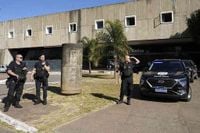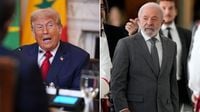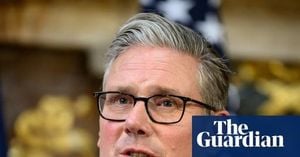Brazil’s political landscape has been rocked once again as former President Jair Bolsonaro was ordered by the Supreme Court to wear an electronic ankle monitor, a move he decried as a “supreme humiliation.” This development came on July 18, 2025, amid a sweeping investigation accusing Bolsonaro of masterminding a coup attempt to overturn the 2022 presidential election, which he lost to Luiz Inácio Lula da Silva.
The Supreme Court’s decision to impose this and other strict restrictions followed a federal police investigation that identified Bolsonaro as a flight risk. Authorities also raided his residence and his party’s headquarters in Brasília, enforcing the court’s orders. Alongside the ankle monitor, Bolsonaro is barred from leaving his home at night, communicating with foreign diplomats, visiting embassies, using social media, or contacting individuals under investigation, including his son Eduardo Bolsonaro, a Brazilian lawmaker residing in the United States.
Justice Alexandre de Moraes, who is overseeing the case, stated in the unsealed court order that Bolsonaro and his son might have committed crimes such as coercion during legal proceedings, obstruction of investigations involving a criminal organization, and attacks on Brazil’s sovereignty. The charges against Bolsonaro are grave: leading an armed criminal organization, attempting a coup, and the violent abolition of democratic rule, along with aggravated damage to heritage sites.
Federal police investigations traced the criminal organization’s activity back to at least 2021. After Bolsonaro’s defeat in 2022, the group allegedly conspired to overturn the election results. Prosecutors say this conspiracy included plans to assassinate President Lula and a Supreme Court justice. The January 8, 2023, riot—when Bolsonaro supporters stormed government buildings—was described as an effort to force military intervention and overthrow the new administration.
Prosecutor-General Paulo Gonet summarized Bolsonaro’s conduct as “a conscious effort to create an environment conducive to violence and a coup,” moving well beyond passive resistance to electoral defeat. This assessment underscores the seriousness of the charges, which carry potential sentences of up to 12 years for the coup plot alone. Combined with other charges, Bolsonaro could face decades behind bars.
Bolsonaro has consistently denied all allegations, portraying himself as a victim of political persecution. Echoing former U.S. President Donald Trump, he branded the trial a “witch hunt.” Since being barred from social media, Bolsonaro posted on the platform X that “those who challenge the system are being punished, silenced, and isolated.” Regarding the recent restrictions, he told journalists in Brasília, “I never thought about leaving Brazil, I never thought about going to an embassy, but the precautionary measures are because of that.”
The trial is ongoing, with the prosecution having called for a guilty verdict in mid-July 2025. The defense is expected to present its case in the coming weeks, with a Supreme Court decision anticipated before the end of the year. Legal experts, such as Antonio José Teixeira Martins of Rio de Janeiro State University, suggest Bolsonaro could be detained even before a verdict if the court deems it necessary to maintain public order and prevent flight risk.
Meanwhile, the case has sparked a fierce diplomatic row between Brazil and the United States. On July 18, 2025, the U.S. State Department imposed visa restrictions on Brazilian judicial officials involved in Bolsonaro’s trial, including Justice Alexandre de Moraes and seven other Supreme Court justices. This unprecedented move was a direct response to the court’s actions against Bolsonaro, particularly the issuance of search warrants and restraining orders.
U.S. Secretary of State Marco Rubio criticized Moraes’s role, stating that the judge’s “political witch hunt against Jair Bolsonaro created a persecution and censorship complex so sweeping that it not only violates basic rights of Brazilians, but also extends beyond Brazil’s shores to target Americans.”
Brazilian judicial officials, however, have vowed not to be intimidated. Solicitor General Jorge Messias condemned the visa revocations as “arbitrary acts” against officials fulfilling their constitutional duties. Messias emphasized that the judiciary would continue its “independent and dignified exercise” despite foreign pressure.
The visa bans have further inflamed tensions between the two countries. Bolsonaro’s son Eduardo, who has been lobbying from the U.S. to pressure Brazil’s institutions, is now barred from communicating with his father due to the court’s restrictions. Eduardo described the court’s actions as a “doubling down” by Moraes, while Bolsonaro’s elder brother, Senator Flávio Bolsonaro, lamented that “prohibiting a father from speaking to his own son is the greatest symbol of the hatred that has consumed Alexandre de Moraes.”
The diplomatic dispute intensified after former U.S. President Donald Trump directly linked a 50% tariff on Brazilian imports—set to take effect on August 1, 2025—to Bolsonaro’s judicial situation. Trump condemned the trial as “terrible and unjust” and demanded its immediate end in a letter to Bolsonaro, posted on his Truth Social platform. He reiterated his threat to maintain the tariffs, declaring, “I will be watching closely.”
Brazilian President Lula responded forcefully, calling Trump’s threats “blackmail” and asserting, “No gringo is going to give orders to this president.” Lula also announced that Brazil was considering retaliatory tariffs on U.S. goods, including technology products. This confrontation has unexpectedly bolstered Lula’s popularity, with many Brazilians rallying against perceived foreign interference.
Political analyst Oliver Stuenkel of FGV University remarked, “U.S. observers are underestimating the power of Brazilian nationalism. There’s a strong response to what’s seen as aggressive interference by Trump.”
Justice Alexandre de Moraes has become a target for conservative U.S. figures, especially for his crackdown on misinformation and social media platforms. Trump’s media company, Trump Media and Technology Group, filed a lawsuit against Moraes in a Florida court, accusing him of violating free speech rights.
As the trial unfolds, the stakes remain high. Brazil’s top electoral court has already banned Bolsonaro from running for office until 2030, citing abuse of power and unfounded claims against the electronic voting system. Whether Bolsonaro will face incarceration before a verdict or after remains uncertain, but the political and judicial ramifications of this case will resonate for years to come.
With the Supreme Court’s decision looming and diplomatic tensions escalating, Brazil finds itself at a crossroads between upholding judicial independence and navigating international pressures. The world watches closely as this dramatic chapter in Brazil’s democracy continues to unfold.





